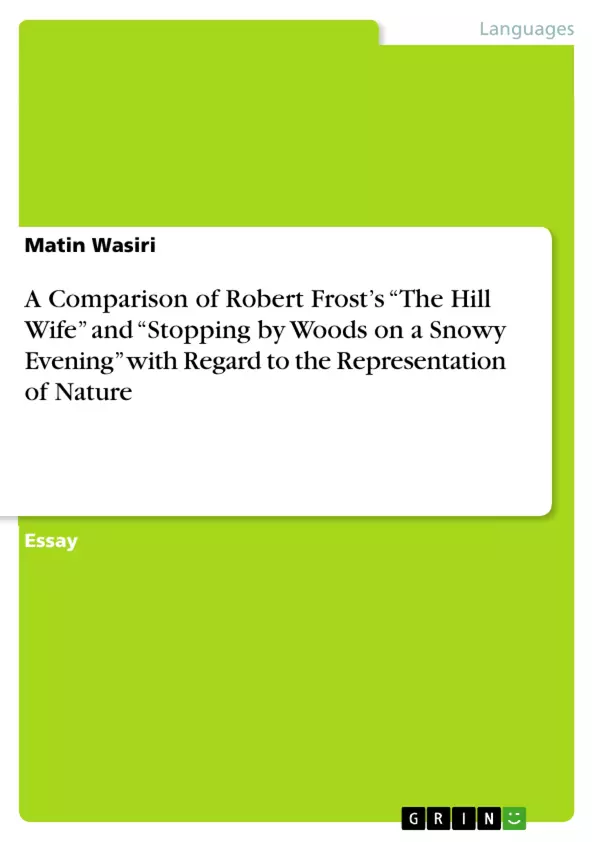When comparing Robert Frost’s poems “The Hill Wife” and “Stopping by Woods on a Snowy Evening”, the first thing that strikes the eye is what ominous and dark connotations the simplest natural events seem to carry. In his poem “The Hill Wife”, Robert Frost invokes a theme of peril by giving a sense of foreboding to everyday occurrences in a married couple’s life. These occurrences are mostly physical and biological events, such as the swarming of birds, the dark in the night, or the scratching on windows of branches moved by the wind. One occurrence however – though not unambiguously so – hints at the reason of the later death of the woman.
Table of Contents
- The Hill Wife
- Birds Going and Coming
- Criticism of Birds
- Darkness and Threats
- The Pedlar
- Anxiety of the Inhabitants
- The Impulse
- Stopping by Woods on a Snowy Evening
- The Traveler's Rumination
- The Horse
- The Woods as Death
- Comparison of the Poems
- Darkness
- The Woods
- Personified Elements of Nature
Objectives and Key Themes
This analysis delves into the representation of nature in two of Robert Frost's poems, "The Hill Wife" and "Stopping by Woods on a Snowy Evening." The analysis explores how the poems use nature to create different atmospheres and convey specific themes. * **Nature as a Symbol of Peril and Unease:** Both poems depict nature as a source of potential danger and anxiety. * **The Allure of Nature:** The poems also explore the allure of nature, particularly the temptation to escape the demands of civilization. * **Darkness as a Metaphor:** The recurring motif of darkness in both poems carries different connotations, signifying both threat and allure. * **Personification of Nature:** Both poems utilize personified elements of nature to enhance the overall atmosphere and symbolism. * **Nature's Role in Human Experience:** The poems ultimately examine the complex and multifaceted relationship between humans and the natural world.Chapter Summaries
The Hill Wife
This chapter focuses on "The Hill Wife," analyzing how Robert Frost uses nature to create an atmosphere of foreboding and unease. The chapter explores the poem's portrayal of everyday occurrences in the couple's life, such as the swarming of birds and the darkness of night, which take on ominous connotations. It also examines the suspicious pedlar, whose presence adds to the sense of danger surrounding the couple.Stopping by Woods on a Snowy Evening
This section examines "Stopping by Woods on a Snowy Evening," focusing on the speaker's experience of solitude and the allure of the snowy woods. The chapter analyzes the poem's use of nature to illustrate the speaker's inner struggle between his desire for solitude and his responsibilities. It explores the symbolism of the woods and the role of the horse in the poem.Comparison of the Poems
This chapter draws a comparison between the two poems, focusing on how both utilize nature-based metaphors to create different atmospheres. The analysis highlights the common elements of darkness, the woods, and personified constituents of nature, examining how these elements are used to create a sense of uneasiness in "The Hill Wife" and an atmosphere of temptation in "Stopping by Woods on a Snowy Evening."Keywords
The key words and concepts explored in this analysis include: Robert Frost, nature, poetry, symbolism, atmosphere, "The Hill Wife," "Stopping by Woods on a Snowy Evening," darkness, woods, personified nature, peril, allure, solitude, civilization, and human experience.Frequently Asked Questions
What is the main focus of this literary analysis?
The analysis compares how nature is represented in Robert Frost’s poems "The Hill Wife" and "Stopping by Woods on a Snowy Evening," focusing on themes of peril, allure, and darkness.
How does Frost depict nature in "The Hill Wife"?
In "The Hill Wife," nature is portrayed with ominous and dark connotations. Everyday natural events, like the swarming of birds or branches scratching on windows, create a sense of foreboding and unease.
What does the darkness symbolize in both poems?
Darkness serves as a metaphor in both works, but with different meanings: in "The Hill Wife," it signifies threat and anxiety, while in "Stopping by Woods on a Snowy Evening," it represents a seductive allure and the temptation to escape responsibility.
What role does the horse play in "Stopping by Woods on a Snowy Evening"?
The horse acts as a link to civilization and responsibility, questioning the speaker's decision to stop and linger in the solitude of the woods.
How is nature personified in these works?
Frost uses personified elements of nature, such as the wind or the woods themselves, to enhance the atmosphere and create a more intimate, often threatening, relationship between the characters and their environment.
- Citation du texte
- Matin Wasiri (Auteur), 2012, A Comparison of Robert Frost’s “The Hill Wife” and “Stopping by Woods on a Snowy Evening” with Regard to the Representation of Nature, Munich, GRIN Verlag, https://www.grin.com/document/230552



